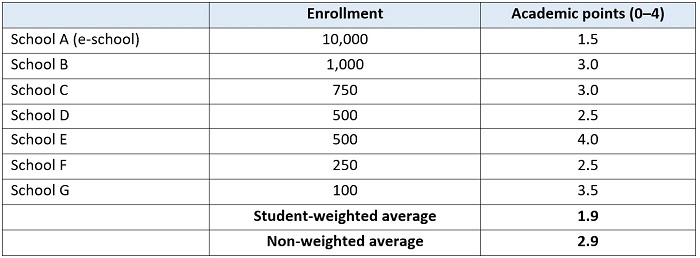As this year’s budget process races to the finish line, state lawmakers are the midst of making decisions about what stays and what goes. The current, Senate-passed version of the budget bill has dozens of provisions that would move K–12 education in the right direction. These proposals, which include improved charter school funding and early literacy initiatives, will hopefully sail through conference committee. But one provision related to charter sponsor evaluations should definitely be scrapped. It would significantly alter the way in which the Ohio Department of Education (ODE) calculates a sponsor’s academic rating. If enacted, it would unacceptably weaken accountability, especially for online charter schools.
By way of background, charter sponsors, or “authorizers,” are the gatekeepers of quality in the charter sector. They allow a charter school to open, keep checks on the school’s performance, and have the authority to close a school should it underperform. Various entities, including the Fordham Institute’s sister organization, the Thomas B. Fordham Foundation, serve as sponsors in Ohio.
To ensure that sponsors rigorously hold their schools accountable for results, state lawmakers created a system in the mid-2010s that evaluates sponsors. It consists of three equally-weighted components:
- Academics—based on the report card results of the schools a sponsor oversees;
- Compliance—based on a review of compliance with laws and regulations; and
- Quality practices—based on a review of sponsors’ adherence to best practices.
The academic dimension, in particular, is critical to holding sponsors accountable for authorizing quality schools. To compute the academic rating, ODE currently calculates an average that weights schools in a sponsor’s portfolio according to their enrollment. This is exactly the right approach. The weighted-student average ensures that all students matter and are accounted for in a sponsor’s portfolio. It also ensures that each school is given appropriate emphasis in the calculations. Larger schools carry more weight—as they should—than smaller ones.
Unfortunately, a provision in the Senate budget would require ODE to calculate two scores—and use the higher of the two to determine the academic rating of a sponsor. The first calculation would still be the weighted-student average, as described above. But the second would weight each school equally—a straight-up average that counts each school as if they had the same enrollment. This approach ignores the fact that some schools are larger—much larger, in some cases—than others. It’s akin to saying that Ohio should get the same number of electoral college votes as tiny Delaware.
The worrisome implication of the proposal is that it could mask the poor performance of larger schools, particularly online charters that enroll thousands of students each year. By allowing the straight-up average to be applied instead of the student-weighted one, online schools—and their sponsors—would get off the hook if their academic performance is poor. Consider how the results change when using some illustrative data for a fictitious sponsor that authorizes a big e-school. (Note: The two largest online charters in Ohio enrolled 14,591 and 5,696 students in 2021–22; both posted low ratings on their report cards.)
Table 1: Illustrative calculation of a sponsor’s academic rating

Table 1 illustrates that, under current policy, the results of a large, underperforming e-school receive appropriate emphasis in the overall academic rating. The school in this example enrolls 76 percent of the students in the sponsor’s portfolio, and its results are correctly reflected in the student-weighted average. However, the non-weighted average inflates the sponsor’s score (2.9 instead of 1.9) and allows the low performance of the e-school to be papered over, even though it’s responsible for serving far more students than the other schools.
This is wrong for a couple reasons. First, students should be at the center of accountability systems. The current academic calculations do exactly that by treating students (as opposed to schools) on equal terms. If the proposal is approved, however, online students will actually count much less than their peers in other schools. Doesn’t their learning matter just as much as a student attending a brick-and-mortar charter school? Remember, in school district accountability, the state doesn’t equally weight schools of varying sizes and then compute an average for the entire district. Rather, it looks at each student enrolled in the district and counts them all equally. The same should apply to the portfolio of sponsors.
Second, accountability systems should drive improvements that benefit students. The academic component of the present evaluation system adheres to this notion. Should a sponsor authorize a large underperforming e-school, it’s incentivized to: (a) take steps to ensure that the e-school improves and (b) offset its results by authorizing high-performing brick-and-mortar charters. Those healthy incentives go away under this proposal. Sponsors’ academic ratings will go up artificially, taking the pressure off to demand improved online education while also ensuring the rest of their schools are high-performing.
Those steps backwards would threaten the tremendous progress Ohio has made in charter school accountability, and would do nothing to help solve the problem of low-performing e-schools, whose struggles have damaged the sector’s reputation in the past and continue to bog down overall charter performance. We shouldn’t go back to the dark ages of accountability, and this idea would be a regrettable reversal of sound policy.
The sponsor evaluation system remains the linchpin for overall charter sector quality. To be sure, the quality practices and compliance components of the evaluation are not perfect. There are provisions in the budget that could potentially reduce the unnecessary paperwork burdens on sponsors by requiring ODE to seek external support to review the system. However, the academic component is strong and should not be watered down. The charter sector is poised for exciting growth through long-awaited equitable funding, but legislators still need to keep the focus on providing high-quality schools for students by maintaining strong charter accountability.




